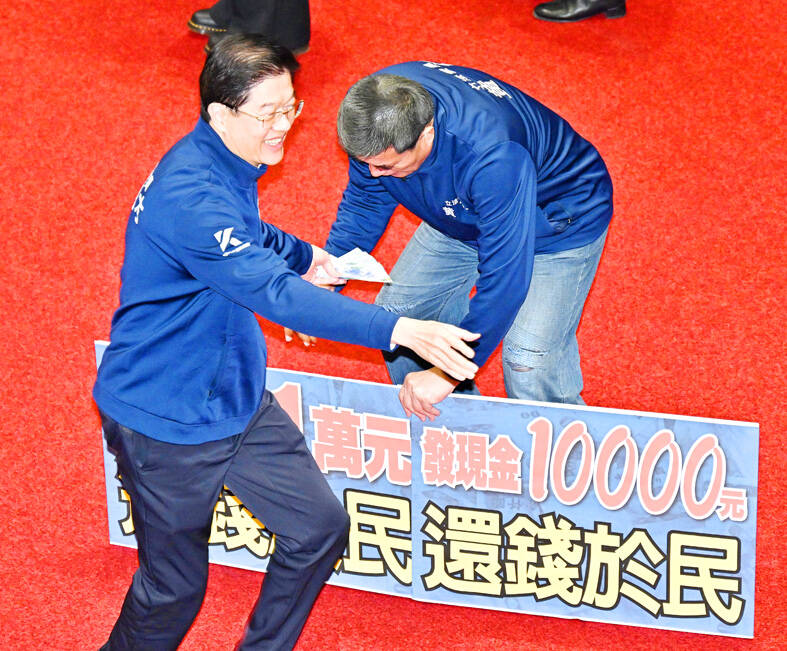The Legislative Yuan yesterday passed on first reading the Chinese Nationalist Party’s (KMT) proposals to distribute NT$10,000 each to taxpayers and to raise military pay, and sent the proposals to the legislative committees for further review.
Ministry of Finance records showed that the government collected record-high tax revenues of NT$3.76 trillion (US$114.52 billion) last year, exceeding its budget projections by NT$528.3 billion, the KMT said.
Meanwhile, inflation last year rose 2.18 percent for a third straight year, exceeding the government’s target of 2 percent, the KMT said, citing Directorate-General of Statistics, Budgeting and Accounting (DGBAS) data.

Photo: Tu Chien-jung, Taipei Times
The consumer price index rose another 2.66 percent in January, signifying continued increasing pricing pressure, the party said.
The government’s revenue is generated by taxes levied from the people, and the revenue surplus should be shared with the people, the KMT said.
The Executive Yuan, headed by then-premier Su Tseng-chang (蘇貞昌), in 2022 approved a plan to refund NT$6,000 to taxpayers, it said.
In light of that precedent and as the government has the financial wherewithal, the party has proposed a special tax refund act to distribute NT$10,000 each to taxpayers this year, the KMT said.
The tax refund would be drawn from a special budget, funded by surplus revenue from the previous fiscal year, which should not be limited by Article 23 of the Budget Act (預算法), the draft act states.
The legislation would also only be valid until the end of this year, unless the Legislative Yuan agrees to extend it, the draft says.
The DGBAS has said that the tax surplus should be used to repay national debts or saved for future expenses, such as disaster or pandemic relief, adding that tax refunds should not become a regular thing.
Separately, the KMT proposed amendments that would match the wages of those serving their mandatory military service with the minimum wage, increase payouts for volunteer forces from NT$10,000 to NT$30,000, and increase payouts for combat-duty troops and for overtime.
The amendments would affect the Pay Act of the Armed Forces (軍人待遇條例), the Act of Insurance for Military Personnel (軍人保險條例) and the Veterans’ Assistance Act (國軍退除役官兵輔導條例).
Additional reporting by CNA

The manufacture of the remaining 28 M1A2T Abrams tanks Taiwan purchased from the US has recently been completed, and they are expected to be delivered within the next one to two months, a source said yesterday. The Ministry of National Defense is arranging cargo ships to transport the tanks to Taiwan as soon as possible, said the source, who is familiar with the matter. The estimated arrival time ranges from late this month to early next month, the source said. The 28 Abrams tanks make up the third and final batch of a total of 108 tanks, valued at about NT$40.5 billion

Two Taiwanese prosecutors were questioned by Chinese security personnel at their hotel during a trip to China’s Henan Province this month, the Mainland Affairs Council (MAC) said yesterday. The officers had personal information on the prosecutors, including “when they were assigned to their posts, their work locations and job titles,” MAC Deputy Minister and spokesman Liang Wen-chieh (梁文傑) said. On top of asking about their agencies and positions, the officers also questioned the prosecutors about the Cross-Strait Joint Crime-Fighting and Judicial Mutual Assistance Agreement, a pact that serves as the framework for Taiwan-China cooperation on combating crime and providing judicial assistance, Liang

A group from the Taiwanese Designers in Australia association yesterday represented Taiwan at the Midsumma Pride March in Melbourne. The march, held in the St. Kilda suburb, is the city’s largest LGBTQIA+ parade and the flagship event of the annual Midsumma Festival. It attracted more than 45,000 spectators who supported the 400 groups and 10,000 marchers that participated this year, the association said. Taiwanese Designers said they organized a team to march for Taiwan this year, joining politicians, government agencies, professionals and community organizations in showing support for LGBTQIA+ people and diverse communities. As the first country in Asia to legalize same-sex

MOTIVES QUESTIONED The PLA considers Xi’s policies toward Taiwan to be driven by personal considerations rather than military assessment, the Epoch Times reports Chinese President Xi Jinping’s (習近平) latest purge of the Chinese People’s Liberation Army (PLA) leadership might have been prompted by the military’s opposition to plans of invading Taiwan, the Epoch Times said. The Chinese military opposes waging war against Taiwan by a large consensus, putting it at odds with Xi’s vision, the Falun Gong-affiliated daily said in a report on Thursday, citing anonymous sources with insight into the PLA’s inner workings. The opposition is not the opinion of a few generals, but a widely shared view among the PLA cadre, the Epoch Times cited them as saying. “Chinese forces know full well that